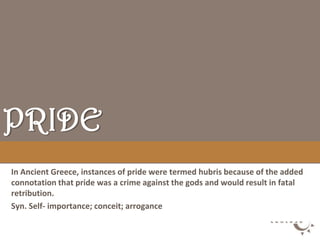Lit
- 1. PRIDE In Ancient Greece, instances of pride were termed hubris because of the added connotation that pride was a crime against the gods and would result in fatal retribution. Syn. Self- importance; conceit; arrogance
- 2. PRIDE PRIDE Views on pride Shown by whom? Achilles- Achilles refuses to help ŌĆóPride is very important to Agamemnon during the times of them, especially to the war against the trojans(text) Acheans/ Greeks Priam - He kissed the hand of ŌĆóPride shall not be shown to Achilles, the one who killed his son Gods; therefore no stain of Hector (text and movie) arrogance shall be shown in dealing with gods Menelaus- Just because his high dignity was stepped down when Helen was into the hands of Paris, he forced his brother to remove the peace talks and redeem Helen back through war. (text and movie)
- 3. PRIDE PRIDE Views on pride Shown by whom? ŌĆóAchilles and his treatment of Hector's corpse in Homer's Iliad demonstrates hubris. (text)
- 4. AGAMEMNON PRIDE Good side Bad side Patriotic/ Sacrificial Self-centered ŌĆóGives importance to his ŌĆóHe always want all the country/ constituents to the treasures and the most point of sacrificing his own beautiful ladies with him daughter to the god to calm Cruel the sea so that theyŌĆÖll reach ŌĆóHe wants to conquer the Troy territory such as that of Troy ŌĆóHe wants to get Helen himself so that he can be the one who will kill her
- 5. Corine Canaya Rhaiza Dellova Raiza Dapilin Vanessa Mora





